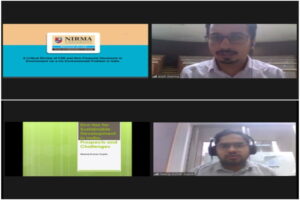
As part of the Faculty Seminar Series at the Institute Prof. Arpit Sharma and Prof. Neeraj Gupta, delivered the talk on their respective themes on December 11, 2020.
Prof. Arpit Sharma, Assistant Professor of the Institute spoke on the topic- A Critical Review of CSR and Non-Financial Disclosure in Environment vis-à-vis Environmental Problem in India. He talked on Corporate Environmental Responsibility which is a need of the hour for the society where corporate has its responsibility on the environment. The first phase of the study focused on disclosure of environmental responsibility by way of voluntary annual disclosure of reports related to the environmental responsibility carried by corporate (sample of top 100 Nifty Companies excluding banking sector). The second phase of the study where the policy measures related to environmental responsibility and its impact of compliance the policy which can be measured through Business responsibility report. He concluded that the outcome of the study depends upon the existing policies and requirement of future policies with respect to environmental responsibility by corporates.
Prof. Neeraj Gupta Assistant Professor of the Institute spoke on the topic- “Eco-tax for Sustainable Development in India: Prospects and Challenges”. The discussion opened with the importance of interdisciplinary approach of law making and how economic principles and elements can help in shaping the environmental law. The second phase of the presentation talked about the meaning of sustainable development and how the same has originated and developed in the international law. Further, the discussion revolved around the legal and economic underpinnings of sustainable development. After the theoretical foundation, the presentation revolved on the issues command and control mechanism and market based instruments for environment regulation. Various laws and policies were highlighted and it was pointed out that Indian laws are primarily based on CAC model. The last part of the presentation talked about GST and its impact on the financial federal structure and whether GST can be utilised for the eco-tax purposes or not. It was concluded that the current GST regime’s theoretical foundations are different from the theoretical foundations of eco-tax and therefore there is a need to align GST with eco-tax.